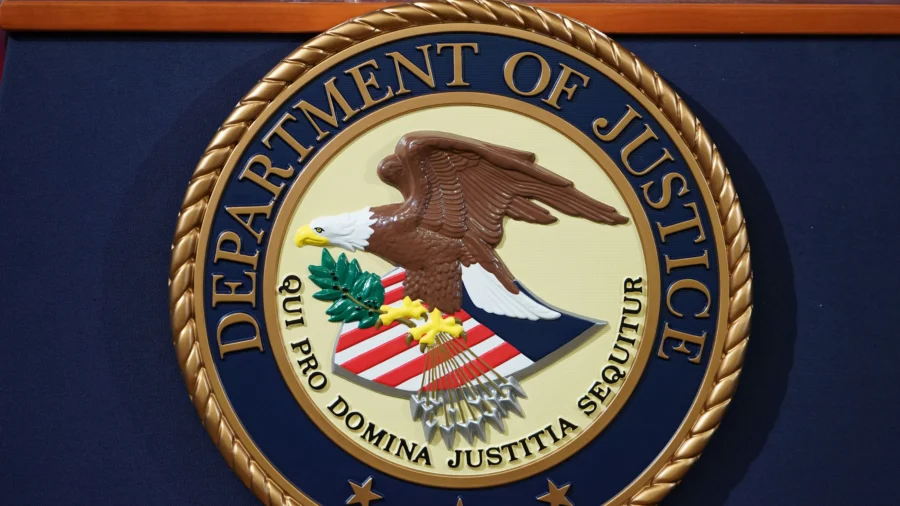The U.S. government announced website seizures and sanctions actions on Sept. 4, to foil alleged Russian government efforts to shape the outcome of the 2024 U.S. elections.
The U.S. Department of Justice on Wednesday announced the seizure of 32 internet domains it alleged were being operated in a Russian government-directed foreign malign influence campaign. The DOJ said the Russian government efforts, which it dubbed “Doppelganger,” breached U.S. money laundering controls and violated trademarks.
The Russian influence operation relied on influencers, AI-generated content, and social media to drive internet traffic to cybersquatted and other domains, according to a DOJ press statement.
The DOJ said some of the websites it targeted mimicked established news sites like those operated by Fox News and the Washington Post, in order “to publish Russian government messaging falsely presented as content from legitimate news media organizations.”
The DOJ said other websites in the alleged influence scheme appeared to be tasked with reposting content from the “Doppelganger” sites.
The DOJ said it had uncovered several internal Russian government documents detailing plans to shift public opinion in target countries, in order to shape election outcomes, including the outcome of the 2024 U.S. elections.
An affidavit for the website seizures accused Sergei Vladilenovich Kiriyenko—a member of Russian President Vladimir Putin’s presidential staff—of overseeing the operation of the “Doppelganger” websites. The affidavit, filed in Pennsylvania on Wednesday, alleges Russian companies Social Design Agency, Structura National Technology, and ANO Dialog also helped steer the operations of the 32 suspect websites.
While the DOJ laid out the “Doppelganger” allegations, the U.S. Treasury Department announced it had designated 10 individuals and two entities for sanctions as part of a broader Russian effort to meddle in the U.S. elections.
The sanctions designation targets ANO Dialog for its alleged role in the “Doppelganger” operation. It also targets ANO Dialog executive Vladimir Grigoryevich Tabak.
The Treasury Department said the second designated entity is a pro-Kremlin hacker group called RaHDit. At a Wednesday press briefing, State Department spokesman Matthew Miller said RaHDit is an acronym that stands for “Russian Angry Hackers Did It.”
The sanctions target RaHDiT’s alleged leader, Aleksey Alekseyevich Garashchenko. The Treasury Department also designated Anastasia Igorevna Yermoshkina and Aleksandr Vitalyevich Nezhentsev to be sanctioned for their alleged involvement with RaHDit.
“Today’s action underscores the U.S. government’s ongoing efforts to hold state-sponsored actors accountable for activities that aim to deteriorate public trust in our institutions,” Treasury Secretary Janet Yellen said.
Other individuals designated for sanctions include Margarita Simonovna Simonyan, Elizaveta Yuryevna Brodskaia, Anton Sergeyvich Anisimov, Andrey Vladimirovich Kiyashko, Konstantin Kalashnikov, and Elena Mikhaylovna Afanasyeva, all of whom are editors or senior employees of RT, a Russian state-sponsored news enterprise formerly known as Russia Today.
The Treasury Department said RT’s leadership began an effort earlier this year to “covertly recruit unwitting American influencers” to assist in Russian influence campaigns. The RT effort used a front company to disguise its involvement—and, by extension, the Russian government’s involvement—in promoting content meant to influence U.S. audiences.
The DOJ announced a related criminal indictment on Wednesday, charging Kalashnikov and Afanasyeva specifically with funneling $10 million to “covertly finance and direct a Tennessee-based online content creation company.”
The indictment, filed in a New York federal court, did not directly identify the Tennessee-based company that received the funding. The indictment referred to the Tennessee-based business entity only as “U.S. Company-1.”
Garland said Kalashnikov and Afanasyeva aimed to expand U.S.-based content channels that carried “hidden Russian government messaging.”
Federal prosecutors contend Kalashnikov and Afanasyeva’s alleged efforts to fund the Tennessee-based company violated anti-money laundering laws and the Foreign Agents Registration Act (FARA).
The money laundering charges carry a maximum sentence of 20 years in prison, while the FARA charges carry a maximum sentence of five years in prison.
Kalashnikov and Afanasyeva remain at large.
Joining in the Wednesday enforcement announcements, the U.S. State Department said it would treat RT, RIA Novosti, TV-Novosti, Ruptly, and Sputnik components working in the United States as foreign agents under the Foreign Missions Act. Miller said this designation will require the five Russian media entities to notify the State Department of all personnel working in the United States and disclose all real property they hold within the United States.
From The Epoch Times

